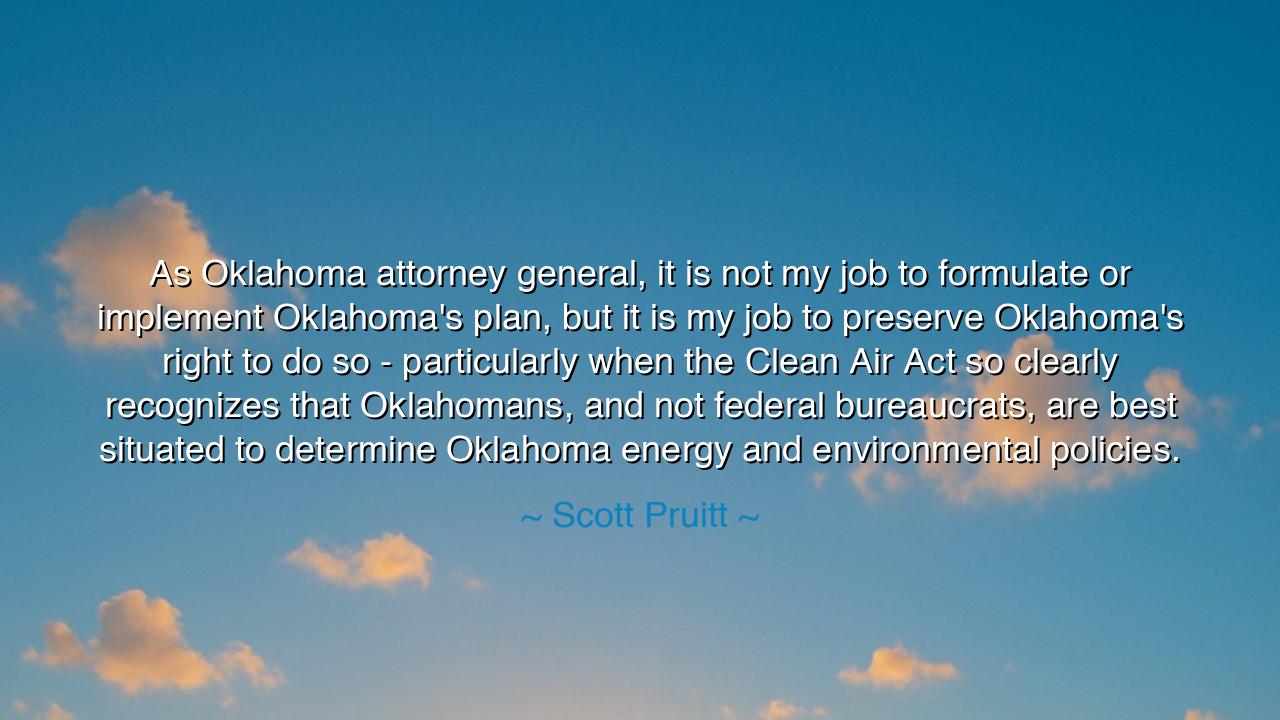
As Oklahoma attorney general, it is not my job to formulate or
As Oklahoma attorney general, it is not my job to formulate or implement Oklahoma's plan, but it is my job to preserve Oklahoma's right to do so - particularly when the Clean Air Act so clearly recognizes that Oklahomans, and not federal bureaucrats, are best situated to determine Oklahoma energy and environmental policies.






The words of Scott Pruitt, spoken from the mantle of state authority, resound with the ancient tension between local sovereignty and distant power: “As Oklahoma attorney general, it is not my job to formulate or implement Oklahoma's plan, but it is my job to preserve Oklahoma's right to do so—particularly when the Clean Air Act so clearly recognizes that Oklahomans, and not federal bureaucrats, are best situated to determine Oklahoma energy and environmental policies.” In these words, he does not merely defend his office, but invokes a principle as old as governance itself: the right of a people to determine their own destiny, free from the dictates of faraway rulers.
At the heart of his saying lies the conflict between federal authority and state sovereignty. Pruitt claims not the power to dictate policy, but the duty to preserve the right of Oklahomans to govern themselves. He invokes the Clean Air Act, a law that, while national in scope, provides space for states to design their own plans to protect the air they breathe. His words remind us that the struggle for self-determination is not fought only in revolutions and wars, but also in courts, statutes, and policies. For to defend the right to decide is itself a heroic act.
History provides many mirrors of this struggle. Consider the cry of the American colonies in the 18th century, who rebelled not because they denied Britain’s strength, but because they demanded the right to craft their own laws. “No taxation without representation” was not merely about coins, but about dignity: the right of a people to shape their future. Likewise, in Pruitt’s words we hear an echo of that spirit—the insistence that decisions about energy, land, and environment are best made by those who live closest to them, who know their soil, their skies, their rivers.
Yet his words also highlight the fragility of balance. For while states guard their independence, the nation as a whole must still ensure the health of its people and its lands. Pollution knows no border; smoke drifts across states, rivers flow beyond boundaries, the air over Oklahoma mingles with the air over Texas and beyond. Here lies the paradox: local wisdom must be honored, but the common good must also be secured. Thus, Pruitt’s words remind us of the constant tension between freedom and unity, between state and nation.
There is also a deeper moral undertone. By defending Oklahoma’s right to chart its own course, Pruitt appeals to the dignity of community self-rule. He declares that those who live in a place, who till its soil and breathe its air, must not be dismissed as incapable of determining their fate. This is a defense of human agency itself—the belief that wisdom resides not only in distant capitals, but in the hands of ordinary people bound to their land.
The lesson, then, is twofold. First, we must cherish the right to self-determination, whether of states, nations, or communities. Power that ignores this right becomes tyranny, no matter how noble its intentions. Second, we must remember that rights bring responsibilities. If Oklahomans claim the right to determine their energy and environmental policies, they must also bear the burden of caring for their air, their land, and their children’s future. Rights are sacred only when exercised with wisdom.
Therefore, children of tomorrow, take these words as both shield and warning. Defend your right to govern yourselves, to make decisions rooted in your soil and skies, for this right is the foundation of freedom. But never forget that your choices ripple outward, touching neighbors and generations yet unborn. The struggle between local rule and collective good will never end—but if you hold fast to both liberty and responsibility, you will walk the narrow path where justice and wisdom meet.






AAdministratorAdministrator
Welcome, honored guests. Please leave a comment, we will respond soon